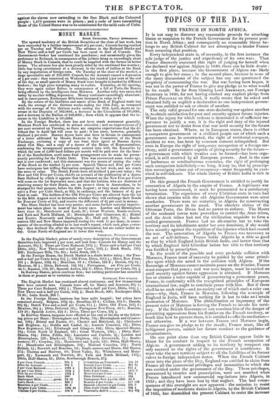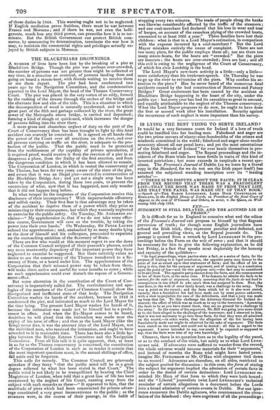TOPICS OF THE DAY.
THE FRENCH IN NORTH AFRICA.
Ix is not easy to discover any reasonable grounds for attaching blame or suspicion to the French Government for its present posi- tion in North Africa and consequently no reasonable blame be- longs to any British Cabinet for not attempting to binder France from assuming that position.
Every independent state is, of necessity, in the first instance the sole judge of the justice and expediency of its own wars. That France discreetly exercised this right of judging for herself when she declared war against Algiers in 1830, there can be little doubt : in the first place, because the Government of Algiers was likely enough to give her cause ; iu the second place, because in none of the many discussions of the subject has any one questioned the propriety of commencing the war. But war having been begun, it was not in the power of France to give any pledge as to what would be its result. So far from blaming Lord ABERDEEN, our Foreign Secretary in 1830, for not having elicited any explicit pledge from Prince POLIGNAC on this head, it really seems that he asked and obtained fully as explicit a declaration as one independent govern- ment was entitled to ask or obtain of another.
The only valid ground for one state declaring war against another is, to obtain satisfaction for past and security against future injuries. When the injury for which redress is demanded is of sufficient im- portance to justify a war, it is the right and duty of the injured government not to desist from that war until security for the future has been obtained. Where, as in European states, there is either a competent government or a civilized people out of which such a government can be constructed, the right of territorial conquest, incident to war, has been by common consent relinquished. But even in Europe the right of temporary occupation of a foreign ter- ritory, until a government capable of giving security for the future- s government with which treaties can be formed—has been orga- nized, is still asserted by all European powers. And in the case of barbarous or semibarbarous countries, the right of prolonging such occupation indefinitely—so long, it may be, that by prescrip- tion sovereignty arises out of occupancy—must frequently be exer- cised in self-defence. The whole history of British India is rich in precedents. On this ground the French Government is entitled to justify its
annexation of Algeria to the empire of France. A legitimate war having been commenced, it must be prosecuted to a satisfactory termination. The experience of every Christian state in turn bad shown that treaties with the old Algerine Government were utter mockeries. There were no materials in Algeria for constructing another government in its stead. The obsolete claims of the Ottoman Porte, the Divan had no power to enforce. The Moors of the seaboard towns were powerless to control the Arab tribes, and the Arab tribes had not the civilization requisite to form a settled government. France had no alternative but to take the territory and its inhabitants under her own dominion, if she would have security against the repetition of the injuries which had caused the war. The annexation of Algeria to France was necessary as an act of self-defence. France holds Algeria by a title as good as that by which England holds British India, and better than that by which England held Gibraltar before her title to that territory was fortified by prescription.
In the event of the possible and even probable collision with Morocco, France must of necessity be guided by the same princi- ples upon which she acted in the collision with Algiers. If the Sovereign of Morocco cannot maintain peace on the frontier, France must conquer that peace ; and war once begun, must be carried on until security against future aggression is obtained. If Morocco has or obtains a ruler capable of guaranteeing a permanent peace, France, in conformity with the recognized principles of European international law, ought to conclude peace with him. But if there shall be no such ruler—and no society out of which such a ruler can arise—why, then, France in Morocco, following the example of England in India, will have nothing for it but to take and retain possession of Morocco. The disinclination or impotency of the present ruler of Morocco is forcing the French to invade his terri- tory. If the British Government can convince him of the danger of permitting aggressions from his frontier on the French territory, or teach him how to prevent them, it is entitled to offer its mediation— not otherwise. If a war between France and Morocco begin, France can give no pledge as to the result ; France must, like all belligerent powers, submit her future conduct to the guidance of circumstances.
On one point alone does any British Cabinet appear liable to
blame for its conduct in respect to the French occupation of Algiers. A government adding to its territory by conquest can only succeed to the rights of the government it overthrows. It must take the new territory subject to all the liabilities of its former rulers to foreign independent states. When the French Cabinet came into the place of the Dey, England was entitled to claim from France all the commercial privileges and immunities to which she was entitled under the government of the Dey. Those privileges, guaranteed by treaties and prescription, were not asserted when France introduced new commercial regulations into Algeria, in 1835 ; and they have been lost by that neglect. The bad conse- quences of this oversight are now apparent : the omission to resist the imposition of moderate duties in Algeria, by the British Cabinet of 1835, has dis enabled the present Cabinet to resist the increase
of those duties in 1844. This warning ought not to be neglected. If English mediation prove fruitless, there must be war between France and Morocco ; and if there be war, not even the belli- gerents, much less any third power, can prescribe how it is to ter- minate. But the British Government can protect British com- merce, by announcing its determination, terminate the war how it may, to maintain the commercial rights and privileges actually en- joyed by British subjects in Morocco.



























 Previous page
Previous page